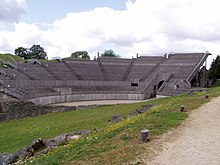Grannus
Grannus ( Gaulish Grannos ) is the name of a healing god of the Celts and was equated with Apollo according to the Interpretatio Romana . His partner was the goddess Sirona .
Adoration
Grannus was apparently the Celtic god with the greatest spread. The center of his veneration lay in the provinces of Lower Germany , Upper Germany and Raetia , including the Agri decumates . Especially in Faimingen , Lauingen (Danube) and Höchstädt an der Donau , all in the Roman province of Raetia, now Bavarian Swabia , many inscriptions dedicated to Grannus were found. The Apollo Grannus Temple , donated by Emperor Caracalla , is located in Faimingen . But dedications can be found from Musselburgh in Scotland and Astorga , province of Hispania citerior ( Spain ) to Ephesus on the Aegean Sea. A bronze bucket with an inscription to Apollo Grannus even comes from a burial mound in Fycklinge near Västerås ( Sweden ). In an inscription from Horbourg-Wihr ( Alsace ) he has the nickname Mogounus "Mächtiger" or "Jüngling" and an inscription from Branges ( Département Saône-et-Loire ) is dedicated to Amarcolitanus , the "far-sighted" or "far-sighted" .
Grannus was not only worshiped by the Celts. After some Alemanni with certain charms and spells the Emperor Caracalla had made (211-217) ill, he asked in vain Apollon Grannus (Γράννος), Asclepius and Serapis for healing.
Grannus was especially revered in therapeutic baths: Aachen , where hot springs rise from the earth, has been called Aquae Granni ("Water of Grannus") at least since the early Middle Ages . The Gallo-Roman spring sanctuary of Grand on the former Roman road Lyon-Trier (today Grand (Département Vosges)) is named after this god , where three inscriptions dedicated to Grannus were found. The Sironabad near Nierstein am Rhein is dedicated to the gods Apollo Grannus and Sirona.
Another cult center of Apollo Grannus could have been in the Trier temple district in the Altbachtal .
Surname
The Gallic name Grannos is usually interpreted as "sun" ( old Irish grían "sun") and that of his partner Sirona as "big star". But a derivation from Indo-European * g uh r-snó-s "warmer" ( Celtic * Grasnos) is more likely, especially since medicinal baths are fed by natural warm springs. In Old Irish, the meaning “warm” has shifted secondary to “sun”.
Birkhan quotes Whatmougs Dialects of Ancient Gaul (1971), which uses an alleged Gallic word granus ("beard", "mustache", also "eyebrow"); However, there is also a Germanic equivalent, compare the German word Granne . The Central Irish grenn or Breton grann cited in the Dictionary of the Irish Language (1983) on p. 370 make a Celtic form seem quite possible. This could indicate the god's adult masculinity and beauty. Birkhan, however, doubts the derivation in Olmsted, since it is difficult to reconcile it with the a-vowelism of ā .
Other well-known Celtic healing god names such as Belenus , Bormo / Borvo and Toutiorix represent regional variants of the same Celtic healing god according to the current state of the art.
See also
literature
- Maximilian Ihm : Grannus . In: Paulys Realencyclopadie der classischen Antiquity Science (RE). Volume VII, 1, Stuttgart 1910, Col. 1823-1827.
- Emil Pauls : About the Granus saga . In: From Aachen's prehistory. Announcements from the association for customers of the Aachen prehistory. 2nd year, Aachen 1889, pp. 21–26 ( Textarchiv - Internet Archive ).
- Bernhard Maier : Lexicon of Celtic Religion and Culture (= Kröner's pocket edition . Volume 466). Kröner, Stuttgart 1994, ISBN 3-520-46601-5 .
- Garrett S. Olmsted: The gods of the Celts and the Indo-Europeans . Innsbruck 1994, ISBN 3-85124-173-8
- Helmut Birkhan : Celts. Attempt at a complete representation of their culture. Publishing house of the Austrian Academy of Sciences, Vienna 1997, ISBN 3-7001-2609-3
Individual evidence
-
↑ CIL III, 5870 In h (onorem) d (omus) d (ivinae) / Apolli (ni) Granno / Baienius Victor / et Baienius Victor / et Baienius Victo / rinus fili (i) eius ex / vis {s} u signum cum base
CIL III, 5871 Apollini / Granno / signum cum / base MIRPA
CIL III, 5873 Apollini Granno et Sanctae Hygiae [3] / [M] at (ri) deum ipsorum pro salute Luci [
CIL III, 5874 [D] ei Apollinis Granni / [pro salute Imp (eratoris) Caes (aris) M (arci) Au] rel (i) Antoni [ni] / [6] / [3] p (atris) p (atriae) / [3 Dio] nysius leg (atus) Aug (usti) pr (o) p (raetore) / [3] Kal (endas) Iunias
CIL III, 5876 Apollini / Granno / M (arcus) Ulpius / Secundus / | (centurio) leg (ionis) III Ital (icae) / cum signo / argenteo / v (otum) s (olvit) l (ibens) l (aetus) m (erito)
CIL III, 5881 Apollini / Granno / Sabinius / Provincia / lis ex voto / l (ibens) l (aetus) m (erito) - ↑ The Roman Inscriptions of Britain (RIB) [1]
- ↑ AE 1968, 230 Serapidi / Sancto / Isidi Myr (i) onym <a = O> (e) / Cor (a) e Invictae / Apollini Granno / Marti Sagato / Iul (ius) Melanio / proc (urator) Augg (ustorum ) / v (otum) s (olvit)
- ↑ 1905 found in the library wall of Ephesus, in Greek script a travelogue through the whole Roman Empire up to Apollo Grannus
- ↑ AE 1903, 273 Apollini Granno / donum Ammillius / Constans praef (ectus) templi / ipsius / v (otum) s (olvit) l (ibens) l (aetus) m (erito)
- ↑ a b c d Helmut Birkhan: Celts. Attempt at a complete representation of their culture. P. 619f.
- ↑ CIL XIII, 5315 Apollini Gran / no Mogouno / aram / Q (uintus) Licini (us) Trio / d (e) s (uo) d (edit)
- ↑ CIL XIII, 2600 Deo Apol / lini Gran / no Amarcolitan (o) / Veranus / Verci f (ilius) Tilander / v (otum) s (olvit) l (ibens) m (erito)
- ^ Cassius Dio: Roman History. 77, 15, 2.
- ↑ Maximilian Ihm : Aquae Grani (Granni) . In: Paulys Realencyclopadie der classischen Antiquity Science (RE). Volume II, 1, Stuttgart 1895, column 300.
-
↑ CIL XIII, 5940 [3] o Invi [cto] / ac deinde c / [3 A] ntoninum / [3] s numini e [ius] / [3] mi ser (vus?) [///] IN [ ///] EC [3] / [3] VM / [3] EI [
CIL XIII, 5942 [Gra] nni [3] / [3 A] quilinus [3] / [3 Li] ngon (ius) VM [ 3] / [v (otum) s (olvit)] l (ibens) [m (erito)]
AE 1937, 55 Deo Apollini] / [Gr] anno Consi [n] ius / [tri] bunus / somno iussus - ↑ All inscriptions in Bernhard Maier: Lexicon of Celtic Religion and Culture. P. 150 f.
- ^ Garrett S. Olmsted: The gods of the Celts and the Indo-Europeans. Innsbruck 1994, ISBN 3-85124-173-8 .
- ↑ see Maximilian Ihm: Bormo . In: Paulys Realencyclopadie der classischen Antiquity Science (RE). Volume III, 1, Stuttgart 1897, Col. 733.

